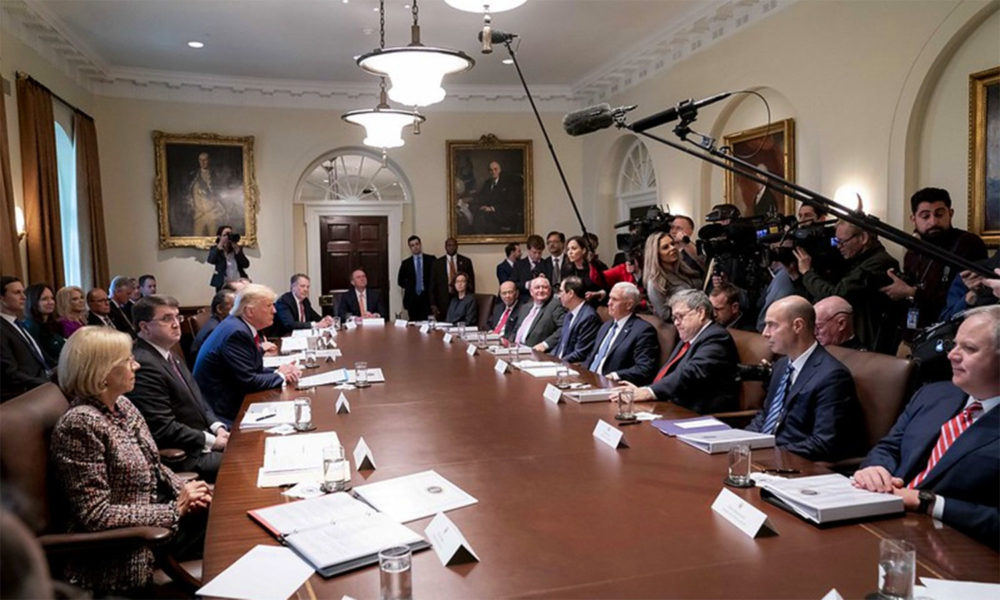In the latest assault on science and the nation’s health and safety, the Trump administration recently proposed a rule that would upend the way federal agencies work to assess and minimize the harm their actions can do to the environment we all depend upon. The move threatens to turn back decades of progress and would shock the architects of the law, including a professor I knew many years ago.
So of course, Secretary of Agriculture Sonny Perdue is all for it.
In rolling out its attack on the landmark National Environmental Policy Act of 1969 (NEPA), the White House put out a press release last week quoting multiple cabinet officials, including Secretary Perdue, with whom I’ve had frequent…let’s say, differences of opinion. Anyway, Perdue had this to say about the new NEPA rule:
While our environment has changed substantially, our NEPA regulations have not been updated in over 40 years. President Trump is continuing to responsibly modernize our regulations to support America’s continued growth and prosperity. Rather than a tool for analyzing the impacts of federal actions, NEPA regulations have become a weapon used by those who seek to keep America’s farmers, producers, and foresters from producing American food and fiber.
A weapon? Seriously? And who believes that anyone wants to keep farmers from producing food? The assertion would be simply absurd if it weren’t dangerously demagogic, pitting Americans against one another with appeals to fear and ignorance.
But consider the source. Ridiculous, disingenuous, dismissive, and mocking statements have become the norm for Trump’s agriculture secretary. (And don’t even get me started about Perdue’s choice of guests for his new podcast, including such honest and not-at-all-ideological characters as Sarah Huckabee Sanders and Newt Gingrich.)
Why would we punish success?
Now, it’s true that, by many measures, our environment has improved substantially in the 50 years since NEPA was enacted (though recent evidence suggests we started backsliding in 2017…ahem). But of course, NEPA and other environmental laws of its era—such as the Clean Air Act and the Clean Water Act—are why we saw those five decades of progress. You don’t stop protecting the air and water we all depend on because the rules have made it cleaner. The fact that those rules worked is why you keep them in place, so they can keep providing benefits to the people whose health and safety the government is supposed to look out for.
Sadly, it’s clear that the current administration is more interested in serving other masters. Polluting industry masters, as the New York Times pointed out last week. The EPA press office’s shrill, fact-less “fact check” in response to that article, along with quotes like Perdue’s above, only serve to underscore how unserious the administration is about its duty to protect the public.
I stumbled on a Twitter thread the other day about democracy that seems relevant here. The part that caught my attention was this:
And so it is with environmental protection. People my age and younger have basically lived their whole lives in a country with ever-improving air and water quality, but we can’t take that for granted. We the people and our government need to keep at it, and to throw ourselves headlong at newer challenges: the climate crisis, emerging chemical threats, and persistent problems like the Gulf of Mexico dead zone.
The greater good demands good regulations
When I was in graduate school studying environmental policy at Indiana University many years ago, I got a short-term gig helping an emeritus professor sort through boxes of old files. The professor, Lynton Keith Caldwell, was a principal architect of the National Environmental Policy Act. He invented the idea of an environmental impact statement, and he argued eloquently for the importance of environmental protection:
Life, liberty, and the pursuit of happiness are all very well but cannot be achieved without the foundation of a healthy environment. In their day, the Founding Fathers did not have to concern themselves with such massive ecological problems as widespread pollution of air, soils, and waters, the build up of toxic wastes, disappearing species, desertification, overpopulation, the threat of nuclear war, or global warming. Education, greater public awareness of and involvement in environmental interactions, stronger government regulation regarding the use and protection of the environment, and the wisdom and understanding to enforce those controls for the greater good are the only ways to ensure a sustainable Earth in the future.
My work for Professor Caldwell was a long time ago, and I don’t remember much about the papers I sorted through. I know we sent some of them to the archives at IU, where he had spent most of his illustrious career.
Born in 1913, Caldwell was in his early 80s when I knew him. Working in his home office, I often joined him and his wife Helen for lunch at their kitchen table, Days of Our Lives playing on the TV in the background. At the time, I didn’t fully grasp the enormity of his legacy. Nor did I appreciate the extent of his impatience at the pace of NEPA’s implementation—in the decades following the law’s passage, he felt it wasn’t being used to its fullest extent.
Professor Caldwell died in 2006, and given what I know now, I can’t help but imagine his deep dismay at the Trump administration’s action this week. In attempting to further undercut the important legislation that was his life’s work, the administration threatens to reverse decades of progress in which all our lives have been made better, however gradually.
Let’s not let that happen.
Read more about how Trump’s NEPA rollback threatens to harm public health and safety, including making us all more vulnerable to the impacts of climate change. Then submit a public comment before the March 10 deadline.


